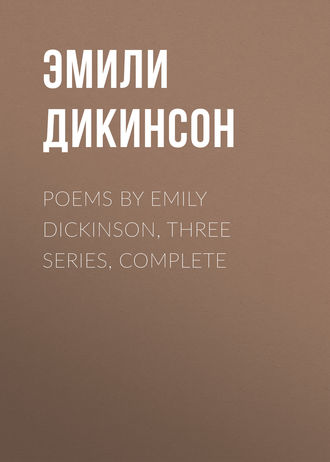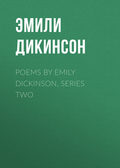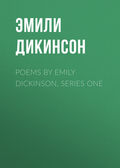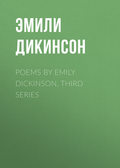
Эмили Дикинсон
Poems by Emily Dickinson, Three Series, Complete
Their lessons scarcely done;
We passed the fields of gazing grain,
We passed the setting sun.
We paused before a house that seemed
A swelling of the ground;
The roof was scarcely visible,
The cornice but a mound.
Since then 't is centuries; but each
Feels shorter than the day
I first surmised the horses' heads
Were toward eternity.
XXVIII
She went as quiet as the dew
From a familiar flower.
Not like the dew did she return
At the accustomed hour!
She dropt as softly as a star
From out my summer's eve;
Less skilful than Leverrier
It's sorer to believe!
XXIX
RESURGAM
At last to be identified!
At last, the lamps upon thy side,
The rest of life to see!
Past midnight, past the morning star!
Past sunrise! Ah! what leagues there are
Between our feet and day!
XXX
Except to heaven, she is nought;
Except for angels, lone;
Except to some wide-wandering bee,
A flower superfluous blown;
Except for winds, provincial;
Except by butterflies,
Unnoticed as a single dew
That on the acre lies.
The smallest housewife in the grass,
Yet take her from the lawn,
And somebody has lost the face
That made existence home!
XXXI
Death is a dialogue between
The spirit and the dust.
"Dissolve," says Death. The Spirit, "Sir,
I have another trust."
Death doubts it, argues from the ground.
The Spirit turns away,
Just laying off, for evidence,
An overcoat of clay.
XXXII
It was too late for man,
But early yet for God;
Creation impotent to help,
But prayer remained our side.
How excellent the heaven,
When earth cannot be had;
How hospitable, then, the face
Of our old neighbor, God!
XXXIII
ALONG THE POTOMAC
When I was small, a woman died.
To-day her only boy
Went up from the Potomac,
His face all victory,
To look at her; how slowly
The seasons must have turned
Till bullets clipt an angle,
And he passed quickly round!
If pride shall be in Paradise
I never can decide;
Of their imperial conduct,
No person testified.
But proud in apparition,
That woman and her boy
Pass back and forth before my brain,
As ever in the sky.
XXXIV
The daisy follows soft the sun,
And when his golden walk is done,
Sits shyly at his feet.
He, waking, finds the flower near.
"Wherefore, marauder, art thou here?"
"Because, sir, love is sweet!"
We are the flower, Thou the sun!
Forgive us, if as days decline,
We nearer steal to Thee, —
Enamoured of the parting west,
The peace, the flight, the amethyst,
Night's possibility!
XXXV
EMANCIPATION
No rack can torture me,
My soul's at liberty
Behind this mortal bone
There knits a bolder one
You cannot prick with saw,
Nor rend with scymitar.
Two bodies therefore be;
Bind one, and one will flee.
The eagle of his nest
No easier divest
And gain the sky,
Than mayest thou,
Except thyself may be
Thine enemy;
Captivity is consciousness,
So's liberty.
XXXVI
LOST
I lost a world the other day.
Has anybody found?
You'll know it by the row of stars
Around its forehead bound.
A rich man might not notice it;
Yet to my frugal eye
Of more esteem than ducats.
Oh, find it, sir, for me!
XXXVII
If I shouldn't be alive
When the robins come,
Give the one in red cravat
A memorial crumb.
If I couldn't thank you,
Being just asleep,
You will know I'm trying
With my granite lip!
XXXVIII
Sleep is supposed to be,
By souls of sanity,
The shutting of the eye.
Sleep is the station grand
Down which on either hand
The hosts of witness stand!
Morn is supposed to be,
By people of degree,
The breaking of the day.
Morning has not occurred!
That shall aurora be
East of eternity;
One with the banner gay,
One in the red array, —
That is the break of day.
XXXIX
I shall know why, when time is over,
And I have ceased to wonder why;
Christ will explain each separate anguish
In the fair schoolroom of the sky.
He will tell me what Peter promised,
And I, for wonder at his woe,
I shall forget the drop of anguish
That scalds me now, that scalds me now.
XL
I never lost as much but twice,
And that was in the sod;
Twice have I stood a beggar
Before the door of God!
Angels, twice descending,
Reimbursed my store.
Burglar, banker, father,
I am poor once more!
Second Series
PREFACE
The eagerness with which the first volume of Emily Dickinson's poems has been read shows very clearly that all our alleged modern artificiality does not prevent a prompt appreciation of the qualities of directness and simplicity in approaching the greatest themes,—life and love and death. That "irresistible needle-touch," as one of her best critics has called it, piercing at once the very core of a thought, has found a response as wide and sympathetic as it has been unexpected even to those who knew best her compelling power. This second volume, while open to the same criticism as to form with its predecessor, shows also the same shining beauties.
Although Emily Dickinson had been in the habit of sending occasional poems to friends and correspondents, the full extent of her writing was by no means imagined by them. Her friend "H.H." must at least have suspected it, for in a letter dated 5th September, 1884, she wrote:—
MY DEAR FRIEND,– What portfolios full of verses you must have! It is a cruel wrong to your "day and generation" that you will not give them light.
If such a thing should happen as that I should outlive you, I wish you would make me your literary legatee and executor. Surely after you are what is called "dead" you will be willing that the poor ghosts you have left behind should be cheered and pleased by your verses, will you not? You ought to be. I do not think we have a right to withhold from the world a word or a thought any more than a deed which might help a single soul. . . .
Truly yours,
HELEN JACKSON
The "portfolios" were found, shortly after Emily Dickinson's death, by her sister and only surviving housemate. Most of the poems had been carefully copied on sheets of note-paper, and tied in little fascicules, each of six or eight sheets. While many of them bear evidence of having been thrown off at white heat, still more had received thoughtful revision. There is the frequent addition of rather perplexing foot-notes, affording large choice of words and phrases. And in the copies which she sent to friends, sometimes one form, sometimes another, is found to have been used. Without important exception, her friends have generously placed at the disposal of the Editors any poems they had received from her; and these have given the obvious advantage of comparison among several renderings of the same verse.
To what further rigorous pruning her verses would have been subjected had she published them herself, we cannot know. They should be regarded in many cases as merely the first strong and suggestive sketches of an artist, intended to be embodied at some time in the finished picture.
Emily Dickinson appears to have written her first poems in the winter of 1862. In a letter to one of the present Editors the April following, she says, "I made no verse, but one or two, until this winter."
The handwriting was at first somewhat like the delicate, running Italian hand of our elder gentlewomen; but as she advanced in breadth of thought, it grew bolder and more abrupt, until in her latest years each letter stood distinct and separate from its fellows. In most of her poems, particularly the later ones, everything by way of punctuation was discarded, except numerous dashes; and all important words began with capitals. The effect of a page of her more recent manuscript is exceedingly quaint and strong. The fac-simile given in the present volume is from one of the earlier transition periods. Although there is nowhere a date, the handwriting makes it possible to arrange the poems with general chronologic accuracy.
As a rule, the verses were without titles; but "A Country Burial," "A Thunder-Storm," "The Humming-Bird," and a few others were named by their author, frequently at the end,—sometimes only in the accompanying note, if sent to a friend.
The variation of readings, with the fact that she often wrote in pencil and not always clearly, have at times thrown a good deal of responsibility upon her Editors. But all interference not absolutely inevitable has been avoided. The very roughness of her rendering is part of herself, and not lightly to be touched; for it seems in many cases that she intentionally avoided the smoother and more usual rhymes.
Like impressionist pictures, or Wagner's rugged music, the very absence of conventional form challenges attention. In Emily Dickinson's exacting hands, the especial, intrinsic fitness of a particular order of words might not be sacrificed to anything virtually extrinsic; and her verses all show a strange cadence of inner rhythmical music. Lines are always daringly constructed, and the "thought-rhyme" appears frequently,—appealing, indeed, to an unrecognized sense more elusive than hearing.
Emily Dickinson scrutinized everything with clear-eyed frankness. Every subject was proper ground for legitimate study, even the sombre facts of death and burial, and the unknown life beyond. She touches these themes sometimes lightly, sometimes almost humorously, more often with weird and peculiar power; but she is never by any chance frivolous or trivial. And while, as one critic has said, she may exhibit toward God "an Emersonian self-possession," it was because she looked upon all life with a candor as unprejudiced as it is rare.
She had tried society and the world, and found them lacking. She was not an invalid, and she lived in seclusion from no love-disappointment. Her life was the normal blossoming of a nature introspective to a high degree, whose best thought could not exist in pretence.Storm, wind, the wild March sky, sunsets and dawns; the birds and bees, butterflies and flowers of her garden, with a few trusted human friends, were sufficient companionship. The coming of the first robin was a jubilee beyond crowning of monarch or birthday of pope; the first red leaf hurrying through "the altered air," an epoch. Immortality was close about her; and while never morbid or melancholy, she lived in its presence.
MABEL LOOMIS TODD.
AMHERST, MASSACHUSETTS,
August, 1891.
My nosegays are for captives;
Dim, long-expectant eyes,
Fingers denied the plucking,
Patient till paradise,
To such, if they should whisper
Of morning and the moor,
They bear no other errand,
And I, no other prayer.
I. LIFE
I
I'm nobody! Who are you?
Are you nobody, too?
Then there 's a pair of us – don't tell!
They 'd banish us, you know.
How dreary to be somebody!
How public, like a frog
To tell your name the livelong day
To an admiring bog!
II
I bring an unaccustomed wine
To lips long parching, next to mine,
And summon them to drink.
Crackling with fever, they essay;
I turn my brimming eyes away,
And come next hour to look.
The hands still hug the tardy glass;
The lips I would have cooled, alas!
Are so superfluous cold,
I would as soon attempt to warm
The bosoms where the frost has lain
Ages beneath the mould.
Some other thirsty there may be
To whom this would have pointed me
Had it remained to speak.
And so I always bear the cup
If, haply, mine may be the drop
Some pilgrim thirst to slake, —
If, haply, any say to me,
"Unto the little, unto me,"
When I at last awake.
III
The nearest dream recedes, unrealized.
The heaven we chase
Like the June bee
Before the school-boy
Invites the race;
Stoops to an easy clover —
Dips – evades – teases – deploys;
Then to the royal clouds
Lifts his light pinnace
Heedless of the boy
Staring, bewildered, at the mocking sky.
Homesick for steadfast honey,
Ah! the bee flies not
That brews that rare variety.
IV
We play at paste,
Till qualified for pearl,
Then drop the paste,
And deem ourself a fool.
The shapes, though, were similar,
And our new hands
Learned gem-tactics
Practising sands.
V
I found the phrase to every thought
I ever had, but one;
And that defies me, – as a hand
Did try to chalk the sun
To races nurtured in the dark; —
How would your own begin?
Can blaze be done in cochineal,
Or noon in mazarin?
VI
HOPE
Hope is the thing with feathers
That perches in the soul,
And sings the tune without the words,
And never stops at all,
And sweetest in the gale is heard;
And sore must be the storm
That could abash the little bird
That kept so many warm.
I 've heard it in the chillest land,
And on the strangest sea;
Yet, never, in extremity,
It asked a crumb of me.
VII
THE WHITE HEAT
Dare you see a soul at the white heat?
Then crouch within the door.
Red is the fire's common tint;
But when the vivid ore
Has sated flame's conditions,
Its quivering substance plays
Without a color but the light
Of unanointed blaze.
Least village boasts its blacksmith,
Whose anvil's even din
Stands symbol for the finer forge
That soundless tugs within,
Refining these impatient ores
With hammer and with blaze,
Until the designated light
Repudiate the forge.
VIII
TRIUMPHANT
Who never lost, are unprepared
A coronet to find;
Who never thirsted, flagons
And cooling tamarind.
Who never climbed the weary league —
Can such a foot explore
The purple territories
On Pizarro's shore?
How many legions overcome?
The emperor will say.
How many colors taken
On Revolution Day?
How many bullets bearest?
The royal scar hast thou?
Angels, write "Promoted"
On this soldier's brow!
IX
THE TEST
I can wade grief,
Whole pools of it, —
I 'm used to that.
But the least push of joy
Breaks up my feet,
And I tip – drunken.
Let no pebble smile,
'T was the new liquor, —
That was all!
Power is only pain,
Stranded, through discipline,
Till weights will hang.
Give balm to giants,
And they 'll wilt, like men.
Give Himmaleh, —
They 'll carry him!
X
ESCAPE
I never hear the word "escape"
Without a quicker blood,
A sudden expectation,
A flying attitude.
I never hear of prisons broad
By soldiers battered down,
But I tug childish at my bars, —
Only to fail again!
XI
COMPENSATION
For each ecstatic instant
We must an anguish pay
In keen and quivering ratio
To the ecstasy.
For each beloved hour
Sharp pittances of years,
Bitter contested farthings
And coffers heaped with tears.
XII
THE MARTYRS
Through the straight pass of suffering
The martyrs even trod,
Their feet upon temptation,
Their faces upon God.
A stately, shriven company;
Convulsion playing round,
Harmless as streaks of meteor
Upon a planet's bound.
Their faith the everlasting troth;
Their expectation fair;
The needle to the north degree
Wades so, through polar air.
XIII
A PRAYER
I meant to have but modest needs,
Such as content, and heaven;
Within my income these could lie,
And life and I keep even.
But since the last included both,
It would suffice my prayer
But just for one to stipulate,
And grace would grant the pair.
And so, upon this wise I prayed, —
Great Spirit, give to me
A heaven not so large as yours,
But large enough for me.
A smile suffused Jehovah's face;
The cherubim withdrew;
Grave saints stole out to look at me,
And showed their dimples, too.
I left the place with all my might, —
My prayer away I threw;
The quiet ages picked it up,
And Judgment twinkled, too,
That one so honest be extant
As take the tale for true
That "Whatsoever you shall ask,
Itself be given you."
But I, grown shrewder, scan the skies
With a suspicious air, —
As children, swindled for the first,
All swindlers be, infer.
XIV
The thought beneath so slight a film
Is more distinctly seen, —
As laces just reveal the surge,
Or mists the Apennine.
XV
The soul unto itself
Is an imperial friend, —
Or the most agonizing spy
An enemy could send.
Secure against its own,
No treason it can fear;
Itself its sovereign, of itself
The soul should stand in awe.
XVI
Surgeons must be very careful
When they take the knife!
Underneath their fine incisions
Stirs the culprit, – Life!
XVII
THE RAILWAY TRAIN
I like to see it lap the miles,
And lick the valleys up,
And stop to feed itself at tanks;
And then, prodigious, step
Around a pile of mountains,
And, supercilious, peer
In shanties by the sides of roads;
And then a quarry pare
To fit its sides, and crawl between,
Complaining all the while
In horrid, hooting stanza;
Then chase itself down hill
And neigh like Boanerges;
Then, punctual as a star,
Stop – docile and omnipotent —
At its own stable door.
XVIII
THE SHOW
The show is not the show,
But they that go.
Menagerie to me
My neighbor be.
Fair play —
Both went to see.
XIX
Delight becomes pictorial
When viewed through pain, —
More fair, because impossible
That any gain.
The mountain at a given distance
In amber lies;
Approached, the amber flits a little, —
And that 's the skies!
XX
A thought went up my mind to-day
That I have had before,
But did not finish, – some way back,
I could not fix the year,
Nor where it went, nor why it came
The second time to me,
Nor definitely what it was,
Have I the art to say.
But somewhere in my soul, I know
I 've met the thing before;
It just reminded me – 't was all —
And came my way no more.
XXI
Is Heaven a physician?
They say that He can heal;
But medicine posthumous
Is unavailable.
Is Heaven an exchequer?
They speak of what we owe;
But that negotiation
I 'm not a party to.
XXII
THE RETURN
Though I get home how late, how late!
So I get home, 't will compensate.
Better will be the ecstasy
That they have done expecting me,
When, night descending, dumb and dark,
They hear my unexpected knock.
Transporting must the moment be,
Brewed from decades of agony!
To think just how the fire will burn,
Just how long-cheated eyes will turn
To wonder what myself will say,
And what itself will say to me,
Beguiles the centuries of way!
XXIII
A poor torn heart, a tattered heart,
That sat it down to rest,
Nor noticed that the ebbing day
Flowed silver to the west,
Nor noticed night did soft descend
Nor constellation burn,
Intent upon the vision
Of latitudes unknown.
The angels, happening that way,
This dusty heart espied;
Tenderly took it up from toil
And carried it to God.
There, – sandals for the barefoot;
There, – gathered from the gales,
Do the blue havens by the hand
Lead the wandering sails.
XXIV
TOO MUCH
I should have been too glad, I see,
Too lifted for the scant degree
Of life's penurious round;
My little circuit would have shamed
This new circumference, have blamed
The homelier time behind.
I should have been too saved, I see,
Too rescued; fear too dim to me
That I could spell the prayer
I knew so perfect yesterday, —
That scalding one, "Sabachthani,"
Recited fluent here.
Earth would have been too much, I see,
And heaven not enough for me;
I should have had the joy
Without the fear to justify, —
The palm without the Calvary;
So, Saviour, crucify.
Defeat whets victory, they say;
The reefs in old Gethsemane
Endear the shore beyond.
'T is beggars banquets best define;
'T is thirsting vitalizes wine, —
Faith faints to understand.
XXV
SHIPWRECK
It tossed and tossed, —
A little brig I knew, —
O'ertook by blast,
It spun and spun,
And groped delirious, for morn.
It slipped and slipped,
As one that drunken stepped;
Its white foot tripped,
Then dropped from sight.
Ah, brig, good-night
To crew and you;
The ocean's heart too smooth, too blue,
To break for you.
XXVI
Victory comes late,
And is held low to freezing lips
Too rapt with frost
To take it.
How sweet it would have tasted,
Just a drop!
Was God so economical?
His table 's spread too high for us
Unless we dine on tip-toe.
Crumbs fit such little mouths,
Cherries suit robins;
The eagle's golden breakfast
Strangles them.
God keeps his oath to sparrows,
Who of little love
Know how to starve!
XXVII
ENOUGH
God gave a loaf to every bird,
But just a crumb to me;
I dare not eat it, though I starve, —
My poignant luxury
To own it, touch it, prove the feat
That made the pellet mine, —
Too happy in my sparrow chance
For ampler coveting.
It might be famine all around,
I could not miss an ear,
Such plenty smiles upon my board,
My garner shows so fair.
I wonder how the rich may feel, —
An Indiaman – an Earl?
I deem that I with but a crumb
Am sovereign of them all.
XXVIII
Experiment to me
Is every one I meet.
If it contain a kernel?
The figure of a nut
Presents upon a tree,
Equally plausibly;
But meat within is requisite,
To squirrels and to me.
XXIX
MY COUNTRY'S WARDROBE
My country need not change her gown,
Her triple suit as sweet
As when 't was cut at Lexington,
And first pronounced "a fit."
Great Britain disapproves "the stars;"
Disparagement discreet, —
There 's something in their attitude
That taunts her bayonet.
XXX
Faith is a fine invention
For gentlemen who see;
But microscopes are prudent





